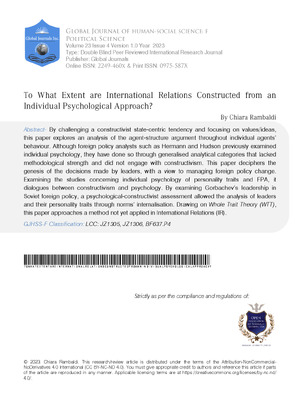To What Extent are International Relations Constructed from an Individual Psychological Approach?
Abstract
By challenging a constructivist state-centric tendency and focusing on values ideas this paper explores an analysis of the agent-structure argument throughout individual agents behaviour Although foreign policy analysts such as Hermann and Hudson previously examined individual psychology they have done so through generalised analytical categories that lacked methodological strength and did not engage with constructivism This paper deciphers the genesis of the decisions made by leaders with a view to managing foreign policy change Examining the studies concerning individual psychology of personality traits and FPA it dialogues between constructivism and psychology By examining Gorbachev s leadership in Soviet foreign policy a psychologicalconstructivist assessment allowed the analysis of leaders and their personality traits through norms internalisation Drawing on Whole Trait Theory WTT this paper approaches a method not yet applied in International Relations IR Thus both the constructivist critique and the WTT appliance in an individual case innovatively takes Hermann and Hudson s work further The paper opens a new research field with detailed sets of worked-through methods throwing light on Gorbachev and how his personality shaped global policy
Downloads
How to Cite
References

Published
2023-10-04
Issue
Section
License
Copyright (c) 2023 Authors and Global Journals Private Limited

This work is licensed under a Creative Commons Attribution 4.0 International License.